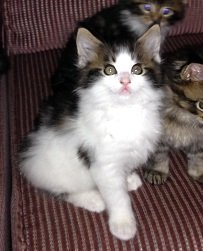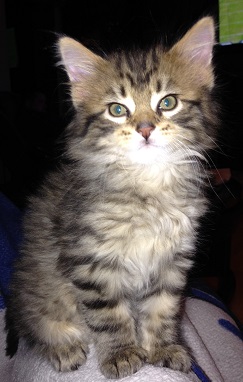Maine Coons: Guidelines to Feeding Kittens

Feeding Kittens
Nothing compares to your Maine Coon Kitten when it comes to cuteness. If you’ve just acquired a kitten (or two), you want to know you are ready to care for your new family member(s). You’ll want to do what you can to ensure that your adorable baby grows into a healthy adult.
Proper feeding is an essential part of the health equation. After complete dependence for the first four weeks of mother’s milk, a kitten gradually transitions to kitten food, and is usually completely weaned at about eight weeks. Maine Coons will however sometimes wean their kittens a little later.
When you bring your kitten home the breeder should supply you with some food that the kitten is accustomed to and you will want to get some filtered water to have available. The kitten’s changing environment will be stressful and you want everything else to be as unstressful as possible.
Kittens are high energy and need lots of food to give them the fuel they need to match the calories they are expending. Kittens eat for comfort and fuel, they are “snackers at heart.” According to Jennifer Larsen at the University of CA Davis.
Although kittens and adult cats have similar needs nutritionally, kittens have a higher need for protein, amino acids, and minerals as well as some vitamins. Kittens need 30% of their energy requirements to be met via protein. This is why you should use only food that is designed for a kitten even if it says it is good for cats of all ages.
What type of food does my kitten need, wet or dry?
It’s important that very young kittens have at least some canned food to eat as part of their diet. Very small kittens have very small teeth and can’t chew dry food well. Without some canned food, they won’t get enough nutrition to grow properly. If you are feeding your kitten both dry and canned foods, then twice a day canned feedings are sufficient. If they’re only eating canned food, they should be fed four times daily.
How can I know I’m selecting a high-quality kitten food?
At a minimum: Buy from a reputable company and always check the label.
The label at a minimum should contain the following: “Meets the nutritional requirements of kittens established by the American Association of Feed Control Officials (AAFCO).” I look for foods that say “Complete and balanced nutrition for kittens based on AAFCO feeding trials.” “Complete and balanced nutrition” means your kitten will require no mineral or vitamin supplementation. Use supplements only if your veterinarian recommends them.

The more we study the more alarmed I have become at how dry food (aka "kibble"), in addition to containing potentially deadly fungal toxins, contains a great deal of bacteria. So in choosing a dry or canned cat food be responsible and make sure you choose high quality food for your precious pal. Don’t misunderstand we agree it would be better to feed your cat any canned food verses a dry food – regardless of the quality of the canned food. This includes Meow Mix, 9 Lives, Fancy Feast, Friskies etc.
We are in the process of learning to make our own cat food. But, we recommend you use caution with homemade diets. Some advocate for a completely raw diet some for a completely cooked. We are a strong advocate for a balance between raw and cooked food for your cat. In all the literature that we have read we agree strongly with Lisa A. Pierson, DVM at www.catinfo.org
If given proper nutrition, your kitten should be healthy and alert, have a steady weight gain, and a clean, glossy coat. If not, check with your veterinarian about possible diet changes or ruling out any health problems.